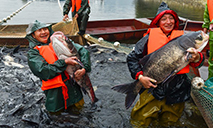HK residents laud first LegCo election under improved system

Voters wait to cast ballot at a polling station in Whampoa, south China's Hong Kong, Dec. 19, 2021.(Xinhua/Wang Shen)
Foreign forces' moves were futile anti-China plots, analysts say
Despite continuous smearing and slander from local radicals and certain backstage manipulators, polling in Hong Kong's first Legislative Council election under the revamped electoral system concluded smoothly on Sunday.
Voters and analysts hailed the poll as open and fair, and said it offered a strong guarantee for the region's future stability and prosperity.
With voters casting their ballots at more than 600 polling stations, 90 lawmakers for the Hong Kong Special Administrative Region's seventh LegCo were elected from the Election Committee, geographical and functional constituencies. After taking office on Jan 1, they will serve the public for the next four years and take part in their first meeting on Jan 12.
For many, the election under the improved system was a totally different experience.
According to an opinion poll conducted by the Bauhinia Institute, a think tank based in Hong Kong, 77.9 percent of 1,528 voters surveyed believed the LegCo election is of great importance to the region's future, and 75.8 percent agreed that the poll would be fair and widely representative. More than 72 percent of those surveyed were confident the election would produce LegCo members who love the motherland and their home city, thus benefiting all Hong Kong people.
This is further evidence that the election, the first major such exercise after the electoral system reform, was more about which candidate can serve the SAR better and help take measures to improve Hong Kong people's livelihoods.
Economist David Wong Yaukar, who is also chairman of the Education University of Hong Kong Council, said the election was a vast improvement on those held previously.
Candidates actively competed on their action agenda and ability. They are also serious about serving the people by bringing about more effective governance that addresses the core interests of the public in areas such as housing, livelihoods, healthcare and the economy. Gone are the candidates who want to advance their personal political agendas by undermining the government and "one country, two systems", Wong said.
Zhao Jiayin, vice-chairman of Hong Kong youth group the Hua Jing Society, said the rational, fair and orderly election is a far cry from previous polls that were often chaotic and politicized to a large degree by radical opposition.
This time, people paid more attention to livelihood and development issues, as well as the ability and quality of candidates, who no longer need to rack their brains to grab more attention by smearing rivals and launching vicious competition. They only need to fully demonstrate their expertise, agenda, contribution and sense of responsibility, Zhao said.
Voices of the majority
Xia Baolong, vice-chairman of the National Committee of the Chinese People's Political Consultative Conference and head of the Hong Kong and Macao Affairs Office of the State Council, said in a speech on Dec 6 that Hong Kong's new electoral system has many advantages, including broad representation, political inclusiveness, balanced participation and fair competition.
Xia said the candidates' backgrounds are "unprecedentedly diverse", and they include many grassroots people, such as bus drivers, electricians and tenants of public housing and subdivided units, which was rarely seen in previous elections.
He added that under the new system, the composition of the Legislative Council has been expanded to include representation from more sectors. Such changes could better help the city balance the interests of different sectors and regions and help it solve deep-seated problems accumulated over the years.
Stanley Sy Ming-yiu, chief executive of a local biotech company, said that after a series of social events, candidates have a relatively unified consensus on Hong Kong's development directions and have been actively seeking change and innovation in their political agenda to better serve the interests of the public.
After Hong Kong was roiled by months of unprecedented violent protests in 2019, the Standing Committee of the National People's Congress adopted two decisions to help the SAR restore order-one to promulgate the National Security Law for the Hong Kong SAR in June last year, and the other to improve the SAR's flawed electoral system, in March this year. Under the revamped system, the number of LegCo members has been increased from 70 to 90, with a newly added Election Committee constituency.
Sy said this change showed broad representation and balanced participation. Candidates for the election included elite leaders from business, academia, and professionals, as well as representatives of laborers, employees, and operators of small and medium-sized enterprises from the grassroots. There were experienced senior political participants and a new generation of young people full of motivation and innovation.
Such diversity will better reflect the voices of the majority of Hong Kong people and respond to their demands, Sy said, adding that the electoral improvement will boost Hong Kong governance to the next level.
Hong Kong business leader Henry Tang Ying-yen said he believed the election also marked the return of healthy and fair competition. In his view, the new system purges election campaigns of the vicious, aggressive and populist squabbles as characteristics of bad democracy. It also rejects social fragmentation and barbaric confrontation.
In this election, candidates could compete on the basis of their platforms, competence and interaction with voters, enabling in-depth discussions on economic and livelihood issues, which are of primary concern to society. The poll also helps channel public opinion and shape policy recommendations that are more in line with the actual situation in Hong Kong, Tang said.
Futile plots
Although polling was successfully completed, some people still attempted to smear Hong Kong's democratic development and discredit the poll by making a fuss over the turnout, which they claimed would reduce the legitimacy of the election.
Many recent overseas examples show that a turnout does not have to reach big numbers. That for the New York mayoral election on Nov 2 was about 24 percent, and for the French regional elections in June, the proportion was 33 percent.
Ho Lok-sang, a veteran economist from Lingnan University, said a high turnout would not necessarily represent the legitimacy of the election. What really matters is the elected lawmakers' ability to serve the public.
"Some people think that a government needs a high rate of endorsement by the vote in order to be legitimate. Believers of Western-style democracy subscribe to the view that only a popularly elected government is legitimate, but this is blind belief," he said.
The turnout was also affected by repeated attempts by local radicals and certain foreign forces to disrupt and slander the election. Fugitives such as Nathan Law Kwun-chung and Ted Hui Chi-fung, who have fled overseas to escape justice, blatantly urged Hong Kong people on social media to boycott the election and cast invalid ballots.
Law, who is wanted by Hong Kong police on suspicion of breaking the National Security Law, delivered a speech on the so-called Summit for Democracy organized by the United States recently, to defame the democratic systems of the Hong Kong SAR and the Chinese mainland.
In addition, some foreign media and politicians smeared the revamping of Hong Kong's electoral system as "democratic backsliding" and expressed support for local residents to spoil the election.
Solicitor and business leader Kennedy Wong Ying-ho said these moves clearly demonstrated the hypocrisy and double standards of the foreign forces.
They have no right to vilify and obstruct other jurisdictions' democratic development under the pretext of advocating democracy, Wong said.
Veteran political analyst Lau Siu-kai said the foreign forces' moves were futile anti-China plots, adding that the influence of Western-style democracy is decreasing around the world due to its deficiencies in promoting people's livelihoods.
He added that instead of blindly following Western-style democracy, Hong Kong's new electoral system has taken into consideration the city's historical background, and conforms to its actuality. Lau believes it is beneficial to Hong Kong's long-term political, economic and social development and the improvement of people's livelihoods.
Jo Lee, a veteran journalist who has specialized in covering social and political issues in Hong Kong and the mainland, said that in the LegCo election people would see "how real democracy works for those who have the people and the country's true interests in their hearts over fake Western-style democracy". "Those fugitives and failed politicians can eat their words," she said.
Mark Pinkstone, former chief information officer of the Hong Kong SAR, noted that the basis for the new candidates is loyalty to Hong Kong.
"Democracy prevails in Hong Kong... No longer will the legislature be used as a base for subversion, as in the past," he said.
Stability and prosperity
Experts also believe the just-concluded polling offers a strong guarantee for the SAR's lasting stability and prosperity.
To ensure the quality of lawmakers, all election candidates received strict scrutiny from the Eligibility Review Committee to check whether they uphold the Basic Law and swear allegiance to the Hong Kong SAR. Among the 154 nominations, 153 were ruled valid, while one candidate was disqualified for holding a government post.
Tang, the business leader, said the improved mechanism helps elect high-quality, capable, committed and loyal patriots to seats in the Legislative Council, who shoulder great responsibility in serving the public well.
By firmly upholding the "patriots administering Hong Kong "principle, the new system also excluded those who aim to undermine the interests of the Hong Kong SAR and the mainland, and thus contributed to the stability of the legislature's future operation, he said.
Instead of creating a homogenous political environment, the new election system encourages political diversity and offers a broad stage for candidates to show their talent, Tang said.
Grenville Cross, senior counsel and former director of public prosecutions in Hong Kong, believes that under the revamped system, the elected lawmakers will be trustworthy and put Hong Kong and national interests first. All of them can be relied upon to promote the "one country, two systems" policy and to make Hong Kong a better place.
After the election, the government will also be able to work with LegCo to resolve long-standing problems and avoid mindless politicking launched by destabilizing forces that led to the social unrest in 2019, he said.
A political environment that prioritizes good governance and social stability will also provide investors with the positive business climate they need, and will enable them to benefit fully from the nation's 14th Five-Year Plan (2021-25) and the Guangdong-Hong Kong-Macao Greater Bay Area development, Cross said.
Wong, the economist and Education University of Hong Kong Council chairman, said the latest revamping of the electoral system represents the most "important and sweeping" change since the establishment of the Hong Kong SAR, as it has redressed the core problem of the old system, which produced a LegCo that was ineffective in solving problems of great concern to the public.
He believes that in the future, LegCo will be well represented by legislators who are knowledgeable in their respective fields and will serve with the broader public interest in mind.
"We can look forward to constructive policy debates that will ultimately help bring about better governance for Hong Kong. In that, I think Hong Kong will get the kind of vibrant democratic system that will serve its people well," he added.
Essence of democracy
In his speech on Dec 6, Xia Baolong noted that the blind pursuit of Western-style democracy has done nothing to help democracy develop in Hong Kong.
It only caused crises of social polarization, vicious competition, economic imbalance and ineffective governance, which led to social turbulence such as the unrest in 2019 over an extradition bill that was later withdrawn, he added.
Gary Wong, a board member of the Chinese Association of Hong Kong and Macao Studies, said people should appreciate that democracy can thrive in different countries in its many shapes and forms.
"The essence of democracy is about respecting diversity. It is not a cookie-cutter," he said.
"The Chinese mainland is well known for putting the concept of 'whole process democracy' into real practice. Our country has successfully converted the vision and values of democracy into a scientific, institutionalized system."
Henry Ho, founder and chairman of the One Country Two Systems Youth Forum, said before the poll, "With a large number of young and fresh faces participating in the LegCo election, we look forward to healthy competition among candidates and more debates on policy preference, good governance and solutions for the city's deep-seated problems."
As a Basic Law scholar, Ho was pleased to see that the new electoral system reflects the original design of Hong Kong's political structure, which is executive-led, with checks and balances between the executive and the legislature, and balanced participation by all parties.
"These important guiding principles in drafting the Basic Law are upheld in the new system," he said.
Teresa Cheng Yeuk-wah, Hong Kong's secretary for justice, said a new democratic electoral system suited to Hong Kong's actual situation and with Hong Kong characteristics was synthesized in order to fully implement "patriots administering Hong Kong" and safeguard the overall interests of society and the constitutional order as set out in the Constitution and the Basic Law.
"All candidates are confirmed in compliance with the legal requirements and conditions for upholding the Basic Law of the Hong Kong SAR and bearing allegiance to the HKSAR of the People's Republic of China. I am confident that all the elected candidates will sincerely serve Hong Kong and pursue the well-being of our citizens," she said.
"This is the purpose of election and also the true meaning of democracy."
Photos
Related Stories
- Hong Kong residents express great confidence in candidates' abilities
- HK LegCo candidates gear up for 1st election without threats and provocations; residents prepare to defend new normal by voting
- U.K.’s interference in Hong Kong affairs to lead nowhere
- Hong Kong's export expected to grow 8 pct next year
- Hong Kong's overall interests to be represented under new electoral system
Copyright © 2021 People's Daily Online. All Rights Reserved.










